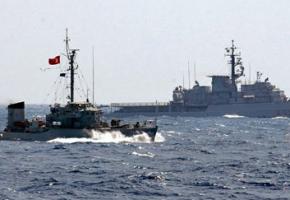The war games off Cyprus
Tensions are high in Cyprus and the surrounding region after the Turkish government sent an energy research vessel, accompanied by warships, into an area of the eastern Mediterranean Sea claimed by Cyprus and targeted for natural gas exploration. The European Union (EU) condemned the actions of the Turkish government, which doesn't recognize the sovereignty of Cyprus and says the island nation belongs to Turkey.
But the EU--along with the U.S. and Israel--is less concerned with sovereignty and more with control over huge reserves of natural gas that have been discovered in the eastern Mediterranean, as well as the region's strategic location. In late October, the navies of Russia and Israel were also in the area off Cyprus' coast, conducting military exercises.
In this editorial written for its newspaper, the (DEA, by its initials in Greek), a revolutionary socialist organization and a founding group in the Coalition of the Radical Left, or SYRIZA, sets out the backdrop to the conflict and explains why the left should organize to oppose the aggression.
AS THIS article was being written, Turkish, Israeli and Russian warships and aircraft are "gathering" in the eastern Mediterranean, south and east of Cyprus.
The Republic of Cyprus has designated the region as its exclusive economic zone. This declaration has officially been recognized only by the state of Israel--even though it also concerns Tunisia, Libya, Egypt, Gaza, Lebanon, Syria, Turkey and Greece, as "neighboring" countries--though it's clear that the U.S. and the European Union (EU) also support Cyprus' claim.
On the basis of this designation, the Republic of Cyprus has for some time entrusted not only natural gas exploration, but also, in essence, mining rights as well, to Western multinational corporations--among them Noble Energy, an American company closely linked to the former Bush administration and an and the crusades of the U.S. in Iraq.
Turkey's reaction to this was expected. The administration in Ankara is using a lot of rhetoric about escalating aggressions, and even talking about "neo-Ottomanism" to express its imperial ambitions in the wider region.

The truth is far more complicated. Turkey finds today that developments in the region could make its worst diplomatic and military nightmares a reality.
First is the possible establishment of an independent Kurdish state in Syria, along Turkey's southeastern border. Second, with the emergence of the Islamic State in Iraq and Syria, there is the possibility of a pan-Arab nationalism seeking the establishment of an Islamic caliphate in the lands of Syria and Iraq, challenging the conditions created by Turkish forces' defeat of the Arabs, which led to the formation of the Ottoman Empire.
The reaction of the Turkish regime to these prospects has highlighted the serious deterioration of relations between Turkey and the U.S. and the open rift in its relations with Israel, which remains the principal policeman for imperialism in the region.
If conditions in the world at large have become unstable and uncertain, the stability in this region in particular has deteriorated at a rapid rate. Iraq has already fallen apart, and Syria will probably share the same fate. Alliances and rivalries now take the extremely dangerous form of changing borders, the creation of new states or the occupation-annexation of regions. The threat of a broader war is increasingly visible.
Under these conditions--for all workers, for all progressives and, of course, for the left--the task is not to argue over who will benefit from the ensuing confusion. The task is to defend a greater good: peace. This is a prerequisite for every pro-labor or populist policy within the economic and social crisis.
The task for us is to remember that in every war, the biggest losers are the workers and the masses. We should remember that the Greek government's purchase of military equipment--these completely paranoid and extravagant expenditures--never ceased, nor were they even restricted, in the years of the economic crisis, in the years when wages collapsed along with the welfare state.
In this context, we ought to remember the refugees and the immigrants. The war in the Middle East--mainly a product of the Great Powers, the U.S., the EU and NATO--has driven and will continue to drive millions of people in search of refuge. We cannot continue to allow these people to drown in the Mediterranean.
Furthermore, we cannot forget about Palestine. The diplomatic, military and economic alliance with the state of Israel is a reactionary policy that serves to vindicate the butchers of Gaza.
Now is not the time for the left to engage in a debate about how much of the Mediterranean belongs to Greece, like just another hypocrite. It's time to state firmly and decisively: No to war under any pretext. No gambling with peace, which is a prerequisite for all progressive policies and social changes.
Translated by Stavroula Harissis


